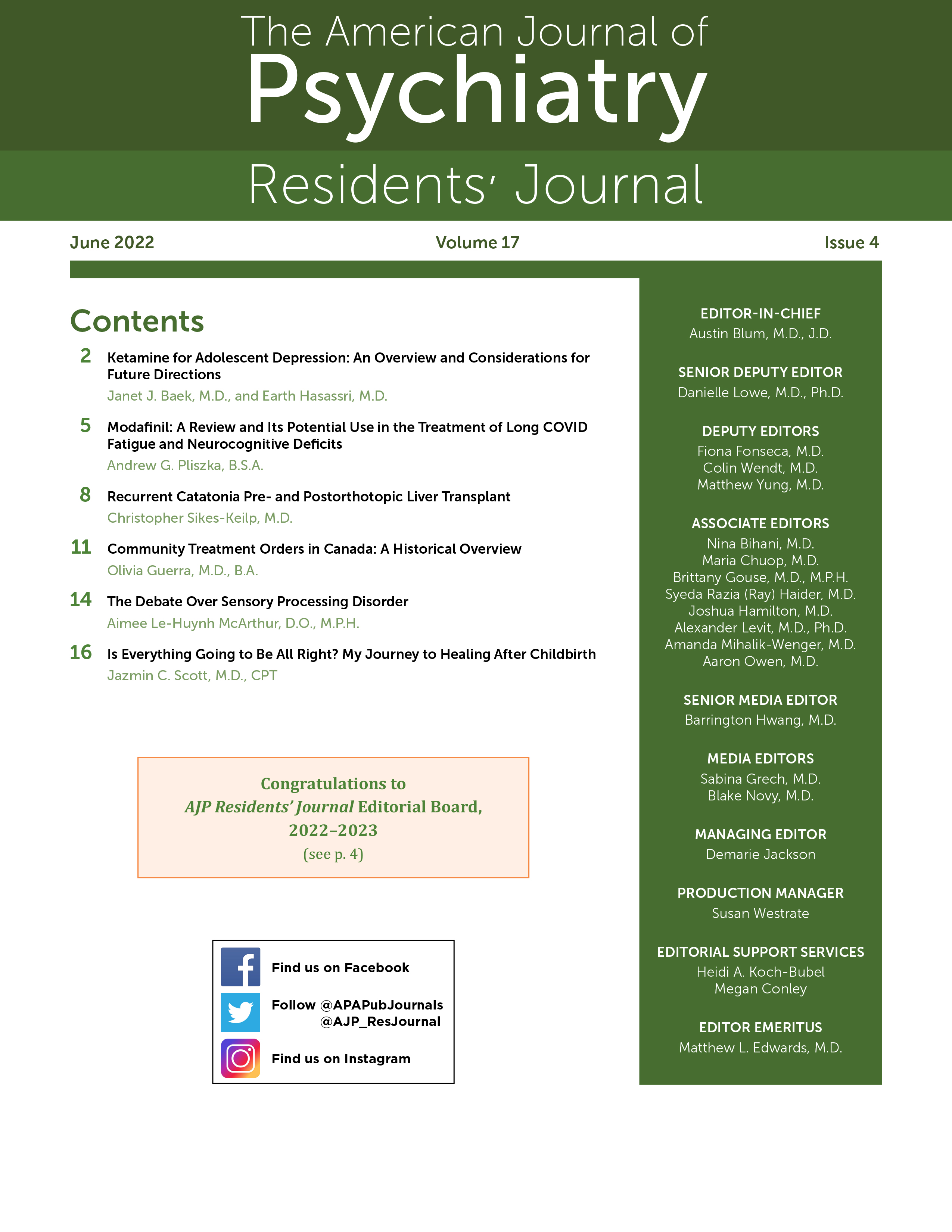Modafinil: A Review and Its Potential Use in the Treatment of Long COVID Fatigue and Neurocognitive Deficits
Modafinil: Side Effects, Drug Interactions, and Mechanisms of Action
| Study | N of subjects | Primary outcome | Results |
|---|---|---|---|
| Bivard et al., 2017 (10) | 232 | Fatigue, as measured by the Multidimensional Fatigue Inventory (MFI); quality of life, as measured by the Stroke Specific Quality of Life Scale (SS-QOL)a | Participants taking modafinil reported a significant decrease in fatigue, compared with those taking placebo (between-group MFI score difference, –7.38, 95% confidence interval [CI]=–21.76 to –2.99, p<0.001). Improved quality of life was also noted for the modafinil group vs. the placebo group (SS-QOL score, 11.81; 95% CI=2.31 to 21.31, p=0.015). |
| Shangyan et al., 2018 (11) | 303 | Fatigue, as measured by the Modified Fatigue Impact Scale (MFIS)b and the Fatigue Severity Scale (FSS)c | Modafinil was superior to placebo; the mean estimated treatment difference between the 2 groups in the MFIS score was –5.27 (95% CI=–8.51 to –2.03, p=0.001). No significant between-group difference was found in FSS scores. |
| Conley et al., 2016 (12) | 541 | Fatigue, as measured by the Brief Fatigue Inventory (BFI); depression, as measured by the Center for Epidemiological Studies–Depression Scale (CES-D) and the depression-dejection subscale of the Profile of Mood States | Among subjects with severe fatigue (BFI score ≥7), those receiving modafinil had lower depression scores, compared with a control group. Modafinil significantly moderated the relationship between baseline fatigue and CES-D total scores (p=0.04). |
| Rabkin et al., 2010 (13) | 115 | Fatigue and depression, as measured by the Clinical Global Impressions–improvement scale | Among patients with fatigue, 73% responded to modafinil and 28% responded to placebo. Modafinil did not have an effect on mood alone in the absence of improved energy. At 6 months, those still taking modafinil had more energy and fewer depressive symptoms, compared with those not taking modafinil, and only the former group showed a significant decline from baseline in their HIV RNA viral load. |
| Sheng et al., 2013 (14) | 535 | Fatigue and excessive daytime sleepiness, as measured by self-reported fatigue, the Epworth Sleepiness Scale, Multiple Sleep Latency Test, and Maintenance of Wakefulness Test | A therapeutic effect of modafinil vs. placebo on fatigue was found for patients with traumatic brain injury (TBI) (mean difference in scores on the Fatigue Severity Scale between modafinil and placebo TBI groups=–0.82, 95% CI=–1.54 to –0.11, p=0.02, I2=0%). A beneficial effect of modafinil on fatigue was not confirmed in the pooled studies of Parkinson’s disease (PD) or multiple sclerosis (MS). Modafinil demonstrated a clear beneficial effect on excessive daytime sleepiness in patients with PD (mean difference in scores on the Epworth Sleepiness Scale between modafinil and placebo PD groups=–2.45, 95% CI=–4.00 to –0.91, p=0.002, I2=14%) but not in patients with MS or TBI. No difference was found between modafinil and placebo in patients with postpolio syndrome. |
Modafinil in the Treatment of Long COVID Fatigue and Neurocognitive Deficits
Key Points/Clinical Pearls
References
Information & Authors
Information
Published In
History
Authors
Metrics & Citations
Metrics
Citations
Export Citations
If you have the appropriate software installed, you can download article citation data to the citation manager of your choice. Simply select your manager software from the list below and click Download.
For more information or tips please see 'Downloading to a citation manager' in the Help menu.
View Options
View options
PDF/EPUB
View PDF/EPUBLogin options
Already a subscriber? Access your subscription through your login credentials or your institution for full access to this article.
Personal login Institutional Login Open Athens loginNot a subscriber?
PsychiatryOnline subscription options offer access to the DSM-5-TR® library, books, journals, CME, and patient resources. This all-in-one virtual library provides psychiatrists and mental health professionals with key resources for diagnosis, treatment, research, and professional development.
Need more help? PsychiatryOnline Customer Service may be reached by emailing [email protected] or by calling 800-368-5777 (in the U.S.) or 703-907-7322 (outside the U.S.).
